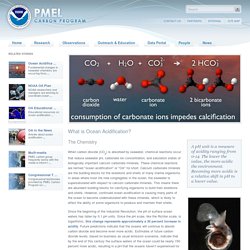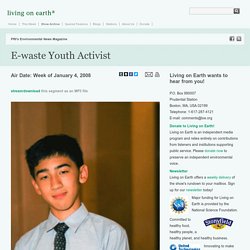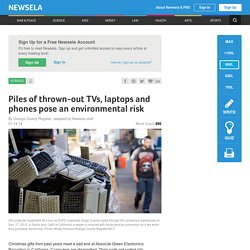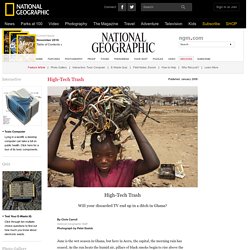

What is Ocean Acidification? A pH unit is a measure of acidity ranging from 0-14.

The lower the value, the more acidic the environment. Becoming more acidic is a relative shift in pH to a lower value. Pteropod Limacina Helicina. Courtesy of Russ Hopcroft, UAF. Pteropod The Chemistry When carbon dioxide (CO2) is absorbed by seawater, chemical reactions occur that reduce seawater pH, carbonate ion concentration, and saturation states of biologically important calcium carbonate minerals. Since the beginning of the Industrial Revolution, the pH of surface ocean waters has fallen by 0.1 pH units. The Biological Impacts Ocean acidification is expected to impact ocean species to varying degrees.
Pteropods The pteropod, or “sea butterfly”, is a tiny sea creature about the size of a small pea. Shellfish In recent years, there have been near total failures of developing oysters in both aquaculture facilities and natural ecosystems on the West Coast. Photo: Freshly harvested oysters from Yaquina Bay, Oregon (Credit: NOAA) Coral. A Student's Guide to Global Climate Change. Living on Earth: E-waste Youth Activist. Air Date: Week of January 4, 2008 stream/download this segment as an MP3 file Alex Lin (Courtesy of Alex Lin) Living on Earth interviews Alex Lin, who won the Brower Youth Award for his pioneering work on electronic waste.

Lin recycled and refurbishes computers for kids in the U.S. and around the world. Transcript CURWOOD: One kid who needs no New Year’s resolutions on the environment is 14-year-old Alex Lin. When the electronic devices we use every day get taken apart or dumped, toxic substances, like lead, leech into the environment. And this year he received the prestigious Brower Youth Award for young environmental leaders.
LIN: Thanks a lot. CURWOOD: So one day you’re reading the newspaper. LIN: I think what helped me choose to do this was that it’s such a little known problem, really. CURWOOD: So how many computers are you guys recycling? LIN: Recycling-wise we’re not really sure about the amount. CURWOOD: So it’s what—5,000 pounds a month or something like that? Piles of thrown-out TVs, laptops and phones pose an environmental risk. Christmas gifts from past years meet a sad end at Absolute Green Electronics Recycling in California.

Computers are dismantled. Their parts get sorted into cardboard bins. One bin holds nothing but hard drives. Another holds AC adapters. Bins stretch in rows across a huge warehouse. Stacked-up printers form a miniature mountain. “There are different grades of boards,” said owner and president Victor Kianipay, stepping past dust-covered TVs to poke into apple boxes filled with circuit boards. E-Waste A Global Problem This is electronic waste, or e-waste. Within five years, the annual figure may reach 65 million tons, the group estimates.
A lot of companies send electronic waste to developing countries. “You see all these thousands — literally thousands — of women and young kids whose job is to cook circuit boards,” said Jim Puckett. Thirty-five nations have adopted the ideas of the Basel Convention, Puckett said. Alex Lin, Teenage Activist. He's overseen the recycling of 300,000 pounds of e-waste.

He's successfully lobbied the Rhode Island state legislature to ban the dumping of electronics. He's used refurbished computers to create media centers in developing countries like Cameroon and Sri Lanka to foster computer literacy. He’s Alex Lin and he’s just 16 years old. “I don’t see anything uncommon in it,” says Lin, a high school senior from Westerly, Rhode Island. “My friends and I have been doing this since fifth grade. Lin’s catalytic moment came in 2004 when he chanced upon a Wall Street Journal article. E-waste, or electronics garbage, is the fastest growing section of the U.S. trash stream. While there is no federal law banning e-waste, 20 states have passed legislation mandating statewide e-waste recycling. High-Tech Trash. June is the wet season in Ghana, but here in Accra, the capital, the morning rain has ceased.

As the sun heats the humid air, pillars of black smoke begin to rise above the vast Agbogbloshie Market. I follow one plume toward its source, past lettuce and plantain vendors, past stalls of used tires, and through a clanging scrap market where hunched men bash on old alternators and engine blocks. Soon the muddy track is flanked by piles of old TVs, gutted computer cases, and smashed monitors heaped ten feet (three meters) high. Beyond lies a field of fine ash speckled with glints of amber and green—the sharp broken bits of circuit boards.
I can see now that the smoke issues not from one fire, but from many small blazes. Choking, I pull my shirt over my nose and approach a boy of about 15, his thin frame wreathed in smoke. People have always been proficient at making trash. Computers are hardly the only electronic hardware hounded by obsolescence. So what happens to all this junk? Teen Activists and Issues.